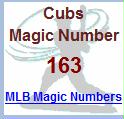Regular TBZ readers may have noticed the “Magic Number” widget we had on the right sidebar. It was a (free) handy little piece of code we got from MLB Magic Numbers. It simply calculated the Cubs’ magic number and updated it on the fly.
After the Cubs clinched, it displayed “Clin”. Any way you spell it, it means Clinch!!.
However, I load up TBZ today and notice that the Cubs’ magic number has impatiently risen to 163. It’s no cruel joke… seems that their coding is ready for 2008.

In years that Cubs have made the playoffs, hurricane activity in the Atlantic has been unusually low. This is because the low pressure systems that typically create the conditions for a hurricane have moved from the West Coast of Africa to just west of Lake Michigan around Addison and Clark streets. This unique atmospheric anomaly has the effect of lowering the ground temperature at Wrigley Field. So instead of the field feeling like 110 degrees with the humidity index, it only feels like 80 degrees or so. Thus, the incredible disadvantage of playing all of those day games in the Friendly Confines is neutralized. So pitchers can pitch in comfort, balls get caught and the atmosphere is less dense, meaning Cubs sluggers can pop them out with ease.
According to my climatologist friend I.M Storm, the tropical depression also brings the soothing breezes off of Lake Michigan in August and September, bringing the additional benefit of natural air conditioning. When I asked him if Global Warming would benefit the Cubs, play, his response was “of course it will.” No longer will the Cubs have to battle snowflakes in April or frosty nights in September. “They will have much warmer weather at both ends of the season.”
You might have also heard that legendary Chicago folk singer Steve Goodman (the author of the song “Go, Cubs, Go”) had his ashes spread in the outfield. So I consulted my friend Vig R. Ro, the famous horticulturist, what this would mean for the ivy and grass conditions. “As you know, human ash contains generous amounts of phosphorous and potassium, which is generally good for the grass and even better for the ivy.” In layman’s terms, that means balls hit out of the infield will roll slower and are more likely to get caught in the ivy. That will enable Alfonzo Soriano to get perhaps a second more to get to the ball and employ that cannon of an arm.
dailywombat.blogspot.com